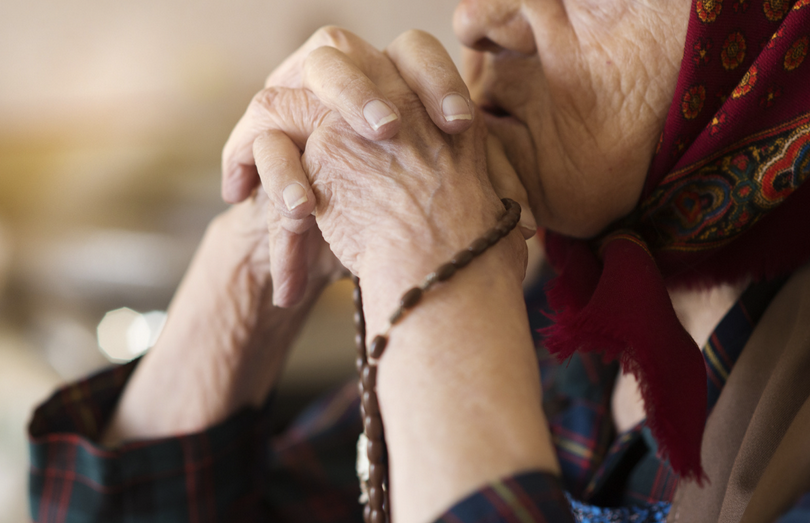In my hometown village, there is a 102-year-old woman, Grandma Chen, the oldest member of the church, who has spent her life living out God's love.
Every Sunday service, you can find her sitting in a wheelchair, pushed to church by her children. Her eldest child is already in his 80s, and the youngest is also over sixty. Each time they bring her, they are careful not to jolt her. Grandma Chen's hearing and vision are still sharp, though she sometimes struggles to recognize people. But whenever someone mentions "attending the service," her eyes light up, and she mutters, "I need to go meet Father." She always refers to God as "Father."
During the service, she sings along with the congregation. One time, when they sang "Those who love the Lord gather together," her voice trembled, but her eyes were full of light. After the service, she would ask her daughter to push her around the churchyard so she could watch the young people move chairs and clean the yard. She murmured, "It's so good; everyone loves God."
When I was young, I often saw Grandma Chen carrying an old cloth bag to church. One time, when it was raining heavily, someone saw her walking in the rain and offered to help her. She waved them off, saying, "No need, my Father is with me."
Grandma Chen never attended school and couldn't even write her own name, but her Bible was worn at the edges from constant reading. Once, I leaned in to take a look, and she pointed to the character for "love" and said, "This word is good. God is love." I asked how she recognized it, and she smiled and said, "I learned it from listening to the pastor." The old Bibles were in traditional Chinese characters, yet Grandma Chen could still read them.
When I was young, there was a mentally disabled man in the village named Xiao Gui. His parents passed away early, and his older brother and sister-in-law took care of him. However, because he couldn't work, they neglected him, and he often went hungry.
When Grandma Chen heard about this, she frequently invited Xiao Gui to her house, offering him food and clothes. From then on, Xiao Gui went to her house every day for meals. In those days, no family was wealthy, and every additional mouth to feed was a burden. Yet, Grandma Chen never turned him away. Xiao Gui, though mentally impaired, was grateful. In winter, he would bring corn stalks from the field and place them in Grandma Chen's yard to help her keep the stove burning.
One day, Grandma Chen had prepared food and was waiting for Xiao Gui, but he didn't show up by mealtime. Concerned, she sent Grandpa Chen to check on him. When Grandpa arrived, he found Xiao Gui lying on the floor, motionless. He rushed to the village health station to find a doctor. Grandma Chen, hearing this, quickly brought the food to Xiao Gui and took care of him. The villagers laughed, saying, "Are the old Chens crazy? They're barely getting by themselves, and yet they take in a fool who can't work. What's the use?" Grandma Chen didn't mind their criticism and continued to care for Xiao Gui until his death.
In her younger years, there was a family in the village that suffered a disaster. The father had broken his leg while working away from home, and the mother and three children had no food to eat. Grandma Chen took the cotton she had prepared for making quilts and gave it to that family, along with half of the cornmeal she had saved. The wife of the man cried and thanked her, but Grandma Chen simply said, "Don't thank me, thank God. He gives us food to eat, and we shouldn't let others go hungry."
When the church was being built, they needed to raise money for materials. Grandma Chen didn't have money, but she went to the construction site every day to help. Because of her age, she couldn't carry bricks, so she crouched on the ground picking up broken tiles or handed workers water. The pastor told her, "Grandma Chen, you should rest at home. We'll handle it." She refused, saying, "The church is God's house, and I have to do my part." When they were still short of money, she took off her silver bangles, which were part of her dowry, and handed them to the pastor, saying, "Sell these. They'll fetch some money." Her children urged her to keep them, but Grandma Chen said, "The bangle is dead, but God's house is alive. Which is more precious?"
Today, Grandma Chen's children take turns caring for her, each eager to honor her example. One day, several of her children were discussing how to care for her, and they ended up arguing—not out of avoidance, but because they each wanted her to stay at their home. The eldest son said, "My yard is big; it's easier to push her wheelchair." The youngest daughter said, "I can make the soft cake she loves to eat, so she should stay with me." In the end, Grandma Chen spoke up, "Let me stay at each of your homes in turn. That way, I'll be blessed by all of you." And they all laughed.
The villagers all say that Grandma Chen is blessed, with obedient children and a long life. The Bible says, "A man reaps what he sows," and Grandma Chen spent her life sowing love. What she reaped was the honor of her children and the peace in her heart.
One time, I asked Grandma Chen's daughter, "Your mother has helped so many people in her life without ever asking for anything in return. Doesn't she feel it's unfair?" She laughed and said, "Mom always says, 'What's the loss? God remembers it all.' She once helped a widow from a neighboring village. A few years later, the widow's son became a doctor and came to see my father when he was sick, refusing any payment. My mother said, 'See, God doesn't forget anyone.'"
In fact, Grandma Chen never sought repayment. She simply believed—believed that God delights in people loving one another, and that doing good for others is doing good for God. Just like when she said in the rain, "My Father is with me." She wasn't saying that God would carry her, but that when your heart is full of God, you can walk the path you need to walk and do the work you need to do with courage.
Now, in church, people often talk about "walking the path," but there are always questions about what that means. Grandma Chen never used the phrase "walking the path," but she lived it through the food she brought to Xiao Gui, the cotton she gave to the family in need, and the steps she took in the rain. She taught me that walking the path is not about doing something grand or earth-shattering; it's about seeing someone in need and offering them food, sitting with someone who is lonely, caring for the elderly in our homes, and living out God's love in our everyday lives.
At that moment, I finally understood why Grandma Chen, who couldn't read, could recognize the words in the Bible—because she had lived the love those words described for her entire life. And why, even in her old age, she still insisted on going to church—because she knew that church wasn't just about completing a task; it was about meeting the "children of God" and reminding them that faith requires action, and love requires deeds. Just as the Bible says, "What good is it if someone claims to have faith but has no deeds?" Grandma Chen's faith was a faith with action; her love was a love that people could feel.
Originally published by the Christian Times
-Edited and translated by Elena Li












